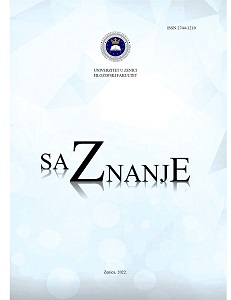STAVOVI NASTAVNIKA O EKOLOGIJI I FUNKCIONALNOSTI SADRŽAJA EKOLOGIJE U UDŽBENICIMA OSNOVNOŠKOLSKE ISLAMSKE VJERONAUKE
TEACHERS' ATTITUTES ON ECOLOGY AND FUNCTIONALITY OF ECOLOGY CONTENTS IN ELEMENTARY SCHOOL TEXTBOOKS OF ISLAMIC RELIGIOUS EDUCATION
Author(s): Nermin Tufekčić, Izet PehlićSubject(s): Islam studies, Environmental and Energy policy, School education, Environmental interactions, Sociology of Education, Pedagogy
Published by: Filozofski fakultet, Univerzitet u Zenici
Keywords: ecological contents; religious education textbooks; school factors of influence; ecological awareness;
Summary/Abstract: The research aim was to examine teachers’ attitudes on ecology and to determine whether ecology contents in elementary school textbooks of Islamic religious education are in the function of developing the ecological awareness and whether teachers give an equal significance to all impact factors and activities at school in the function of developing ecological awareness of their students. The descriptive analytical survey method was used as a research method in examining the teachers’ attitudes. The following research instruments were used: a survey questionnaire on ecology contents in Islamic religious education textbooks, a questionnaire for the teachers regarding ecology and a scale of ecological values (SV-3). The research sample encompassed 100 religious education teachers of different education levels, years of service and the place where they live. According to its nature, it was a target sample. The research results showed that teachers think that the contents in the Islamic religious education textbooks were not sufficiently formed so as to be in the function of developing ecological awareness of students and that teachers give equal importance to all influence factors and activities at school in the function of developing ecological awareness of their students. Teachers think that their families, followed by their schools, mass media and peers have the highest influence on young people’s attitudes towards the environment, whereas free time has the least impact. Teachers ranged the school factors according to their influence degree on students’ upbringing and education for environmental protection in the following way: 1. Professional competence of the teacher, 2. Didactic-methodological competence of teachers, 3. Visits, trips, excursions, 4. Classes, 5. Socially useful work, 6. Textbooks, 7. Public and cultural activities of the school, 8. Class community, 9. School ambience, 10. Students’ free activities and 11. Students’ press.
Journal: saZnanje
- Issue Year: 3/2022
- Issue No: 3
- Page Range: 624-635
- Page Count: 12
- Language: Bosnian

